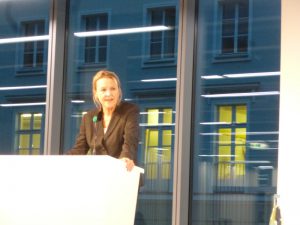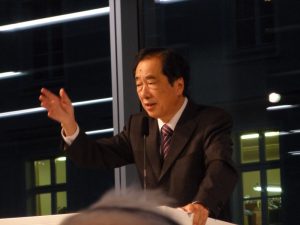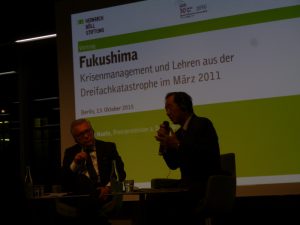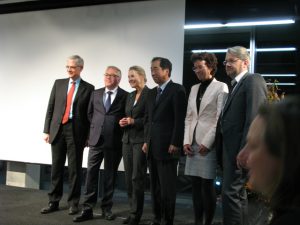[:ja]2015年10月13日(火) にハインリヒ・ベル財団とベルリン日独センターによる菅直人氏の「危機管理-2011年3月の東日本大震災および福島原子炉発電所事故から得た教訓」と題する講演があった.
まずはドイツ側がこの講演の背景,脱原発の状況などを説明した.
- メルケル首相の過去の発言「日本のような世界有数の技術を持つ国ですらあれほどの事故と損害が起きることを考えると,ドイツのためには脱原発は理にかなっている」
- 日本の方が自然エネルギーの可能性が高い.風,太陽光,バイオに追加して,地熱や潮力など,ドイツよりも可能性があり,そして世界有数の技術がある.欠けているのは,おそらく政治的判断だけであろう.

菅氏からは以下のような事故や事故後の政策についての話があった.
事故直後,原発は安全であるという前提に基づいていたため,危機管理は考慮されていなかったことが次々に明るみになった.3月22日頃,最悪のシナリオを専門家に作成してもらうよう依頼した所,250 km 圏内の避難が数十年間必要であると言われた.これは東京を含む 5000 万人に影響がでることを知り,もし5000 万人の避難民が生まれたらどうなるのか,日本が存続できるかどうかの危機と認識した.
初動では政府側も東電でも上層部はほとんど情報を把握できない状況であった.一方で現場の吉田所長はマニュアルにはない独創的な方法を使って炉を冷す努力をしたこと,消防,東電,警察,自衛隊などの,現場の努力が日本を救った大きな力であったことを述べた.メルトダウンした燃料は東電の発表によれば70Sv/h の放射線を出し,人間が浴びれば 5 分と生きられないものである.格納容器は高圧で壊れて穴が開いたが,幸いこの燃料が飛び散る自体にはならなかった.しかし,安全であるとされていたため,事故のシミュレーションもなかったので,格納容器がもし破裂したら燃料はどうなっていたのか不明である.また,4号機の燃料プールには格納容器もなく空焚きによるメルトダウンが心配された.しかし,当時ないはずの水が工期の遅れなどでたまたま存在してその事態は避けられた.「政治家らしい言葉ではないが,神の加護としか思えなかった」と事故について語った.

(撮影:矢嶋宰)
現在も 1 日 300 t の水を入れて冷やしている.しかし格納容器に穴があるので,その水は漏れている.それを汲み上げてタンクに貯めているが,全てを汲み上げることはできない.現在もとても Under control ではない.
福島原発は廃炉作業をしている,予定では 40 年ということだが,菅個人としてはさらに長い時間がかかることだと思っている.
なぜこのような事故になったかを考えると,その原因は以前からの積み重ね,そしてハードとソフトの両方にあった.福島の海岸はほぼ 35 m の高さがある.東電は原発を置く場所として 35 m の高さの高台を 20 m 削って低くした.東電はこれによって冷却水の汲み上げの電気代を安くしたことを利点とした.非常電源の設置場所を低い場所にするなど,ハード的に事故が起こりやすいものとなっていた.一方,ソフト的なこととしては,日本では事故は地震,津波などと同時に起こりやすいが,それが想定されていなかったこと.責任を持つ官僚にも専門家を配置していなかったこと.当時,政府の原発の事故の責任者は経済学者で原発については知らないということがあった.また原発の規制をする側と推進をする側が同一の組織であった.つまりハード,ソフト両面で事故を防げなかった.
3.11 前には,他国の首脳に会った時には日本の原発を買うように勧めていたが,3.11. 以降は考えを完全に変えた.
経産省が安全と推進の両方をしていたが,このソフト面の問題を解決するため,推進と安全の担当を分離し,再稼動の条件を厳しくした.
ドイツの FIT を参考にして,自然エネルギーの導入を推奨した.
将来は日本のエネルギーは原発のみではなく,化石燃料もやめて再生エネルギーにシフトしたい.地球上にふりそそぐ,太陽のエネルギーの 1万分の1で人間の現在の活動は全てまかなえるという研究もある.各国がそれぞれエネルギーを他国に依存しなくなれば,国際紛争の大きな原因の1つであるエネルギー問題を減らすことができる.つまり,世界の安全保障は,エネルギーのシフトによってより高まると考える.ドイツをその先人として見ている.ドイツの中でも様々な意見があるのは知っているが,福島の後の数ヶ月でメルケル首相が再生エネルギーへの転換を判断したことには感銘を受けた.
現在の日本の状況は再生可能エネルギーに向かう方向が遅くて残念な状況である.しかし経済的に考えても原発は安いものではないことが明るみになってきているので,今世紀中には経済的に立ち行かなくなってなくなるとは予想している.しかしそれまでに事故が再び起きない保証はなく,遅いかもしれないので,それを待つわけにはいかない.
最後に,「幸いにして国が壊滅することは避けられた.神の御加護があったと思う.しかし,もう一度事故があった時に,神の御加護はあるのか,私にはわからない.その前に日本の原発をなくすこと,そして世界の原発をなくすることが私の重要な課題である.」としめくくった.
この後,以下のような質疑応答があり,活発な議論が交わされた.
Q: なぜ,事故のあった日本がまだ脱原発できないのか.
A: 現在でも日本の世論調査をすると,過半数は脱原発を望んでいる.しかし,経済界,原子力ムラの力がまだ強く残っている.最終的には選挙によって脱原発を推進するしかないが,前回の選挙では経済政策が争点となって,原発推進の自民党が過半数以上を占めることになった.そのため脱原発は実現できていない.

さまざまな質問に答える菅氏
Q: 東電などは事故があってもどうして原発の推進を続けるのか.
A: 原発推進には東電の意思よりも国の意思が強かった.電力会社自体は国の意思に沿う見返りに,かかった費用の 3% を上乗せして電力料金を決められる権限を持った.総括原価方式である.つまり,電力を生産するのが高コストになればなるほど,利益がでる仕組みが作られた.これは企業努力が不要で利益を生むことができる.したがって,利益を追求する会社は努力せずに利潤が増加できる原発の推進をすることになる.
この総括原価方式によって例えば電力会社がゼネコンにわざと高い注文をすることができる.そのコストは電気の利用者へと転嫁ができる.その一部をゼネコンからキックバックとして得ることで例えば年 2000 億円の政治資金を得る.たとえ,事故によって数兆円を越える負担が国に生じても,それは国民の負担であるので,この利権は魅力である.この力が日本ではまだ強い.そのため,電力会社に有利となるように政治家が活動することが多いことも原因であろう.
Q: 3.11 以前と以降で日本で変わったことは何か.
A: 様々あるが,私が思うことの1つは裁判所の姿勢の変化である.以前は原発の稼働は専門家が決めることであるということで,裁判所は判断をしなかった.しかし,一部とはいえ,裁判所の姿勢は変わりつつある.今後,日本は再生可能エネルギーなどの発展によって,原発が経済的には成り立たなくなると予想する.そして原発は少なくとも今世紀中には世界からなくなるとは思っている.しかしこの変化は政治的でなく,経済的に任せられることは残念である.
Q: 政治的には変化は起きないのか
基本的には草の根の運動の圧力から変化は起こると思う.しかしそれが日本では国政選挙に十分に反映できていない.ドイツは比例代表で決まる部分が高いが日本の小選挙区では,死票が多い.たとえ各地区に 10% の反対がいても,小選挙区制ではそれは死票となり 0 と見なされてしまう.国政選挙に反映されるだけの勢力となるかが重要だが,現在の日本はそこまでに至っていない.
Q: 当時の資料などはどのように検証されているか.
A: 当時は重要な情報が隠されていたし,現在も明るみになっていない部分が多いはずである.東電と福島のサイトの間は 24 時間接続されていた.しかしその情報は東電が選んだものしか出てこない.たとえば,3/15 日に私が東電に行った時に撤退はしないで欲しいと言ったことがある.その映像は公開されているが,その音声はない.東電は手違いで音声を消したと言うが,私個人としては信じられない.関係者の起訴が行なわれて,様々な状況がもっと明かになることを期待している.
Q: 講演にあった東電の事故を拡大させないために奔走した吉田所長とはどういう人か.
A: 吉田所長は残念ながら事故から 2 年後に癌で死亡してしまった.それが被曝の原因かどうかは不明である.事故直後に一度直接会うことができたが,吉田所長は信頼できる人であることがすぐにわかるような人であった.
Q: 避難や帰還はどのような判断で行なわれているのか.
A: 事故当時はモニタリング能力も低く,格納容器が破壊された時のため,避難区域を円状に決めた.その後,放射性物質が風などの影響でどう流れるかによって決めたが時間がかかった.どの程度で避難すべきかは専門家によって違う.現在は1ミリシーベルト/年.子どもに関しては患者の数が増えているが,調べ方が厳しいから増えているだけという考えもある.自治体の判断は帰ってきて欲しいので基準をゆるくしたいと考える傾向.基本的には専門家の意見を聞いて判断しているが,それが適切かどうかは疑問.
Q: なぜあなたの党(民主党)は勝てないのか.
A: 小選挙区制の影響が大きい.小選挙区制は1つの選挙区の中で1位にならないと議席がとれないために,全国で 10% の賛成があっても議席は1つもとれない.
筆者も他の多くの人達同様,事故当時の錯綜する様子,その後についてはinternet 等を通じて様々な情報に触れた.しかし,今回その渦中にいた人の講演を本人から聞くことができたのはまた違ったものであった.この講演を聞き,質疑を聞いている時,ふとその原点,世界の脱原発ということに戻って考えることができた.その原点へと戻ると,危機管理や事故の原因,法整備などは各論となる.最初の質問も,結局なぜこのような大惨事にもかかわらず脱原発が進まないのかへと立ち戻るものであった.私はその質問の最中,メルケル氏はフクシマを他山の石とし,即脱原発ができたのに,どうして菅氏には結果的にできなかったのかと考えた.しかし,実はこの二人の個人の違いではないのではないだろうか.結局これはドイツ国民にはできて日本国民にはできなかったということではないかと考えた.それはチェルノブイリを考えれば,当時のソ連も日本と同様,状況は様々異なるとは言え,即脱原発はできなかったということである.私はこの報告を書きながら,新たにその意味を考えている.

Venue: Heinrich Böll Foundation, Berlin
We had a lecture entitled “Crisis Management – Lessons Learned from the Threefold Catastrophe in March 2011” by Naoto Kan, former prime minister of Japan.
The hosts and German politicians started by introducing this lecture then explaining the current German situation. On German energy policy they mentioned the following:
- Referring to Merkel’s Memorandum and her plan to replace all the German nuclear power plants with renewable energy, they said: “Concerning the fact that even one of the world’s leading technology countries like Japan has faced such a catastrophic accident, it makes sense for Germany to abandon its nuclear power plants.”
- Compared to Germany, Japan has more natural energy. Japan can use wind energy, solar energy, and energy from biomass, but also geothermal and tidal energy. Moreover Japan has world class technology. The only missing piece would be the political decision.

Then, the organizer introduced Naoto Kan. The following is a summary of Kan’s lecture.
Just after the accident [March 11th, 2011], we found out there was no crisis management in Fukushima, because everything was built on the assumption that the atomic reactor was safe. Around March 22nd (2011), I asked a specialist to evaluate the worst-case scenario. He said that all the people who lived inside a circle of 250km radius from the reactors needed to be evacuated for a few decades. Tokyo lies within the circle. 50 million people would lose their home. I recognized that in fact the problem was, if Japan could continue existing. How could we manage 50 million refugees at once if the worst-case scenario happened?
At the early stage of the accident, both the government and TEPCO did not know what happened and could neither manage to circulate information about the accident. On the other hand, the plant manager called Yoshida improvised a new way to cool down the reactors because all the common methods had broken down. Japan was saved by mainly the people on the spot, including fire fighters, police, self defense forces and TEPCO workers. According to TEPCO, the melt down of nuclear fuel emits 70Sv/h radiation. The radiation can kill a nearby person within five minutes. The containment vessel was damaged due to the high pressure, but it only had holes. Therefore, fortunately, this fuel was not dispersed into the air, but melt down into the earth. We found out that there was no simulation for such a high pressure accident, since the assumption had always been, that an accident was impossible. If the containment vessel had blown up instead of just punching holes, we would have had no idea what happened. The fuel pool of reactor IV contained nuclear fuel, but the pool had no containment vessel. We worried that the water could dry, but we could not go near due to the high radiation. However, coincidentally, there was extra water due to the delay of the maintenance work that was being done there and so the meltdown was unexpectedly avoided. “I know this is not the words from a politician, but I can only think that God protected us.” Today we still need to cool down the fuel by putting 300 tons of water every day onto it. But the containment vessel has holes, so the water is leaking. We pumped up the water and put it in tanks. But we cannot pump up all the water. It is still not under control today.

We are working on Fukushima’s decommissioning. The current plan says it will take 40 years, but I personally think we need more time to finish it.
I thought about the question why this accident happened. There was a chain of the causes. They also lie equally in hardware and software, by software human factors are meant. The average height of the shore line of Fukushima is around 35m. TEPCO lowered 20m of this height and reported how they save the pumping water costs for cooling down the reactors. They put the emergency electricity generators at a low place. This severely failed design caused the accident. These are hardware problems. On the other hand, there were also software problems. In Japan many accidents of this kind are caused by earthquakes, which are often followed by tsunamis. However, this possible situation was not considered. The bureaucrats who are responsible for the security of accident are not specialists for atomic reactors. For example, when I met the responsible person of the reactor accident, I asked the responsible person, “are you a specialist for atomic reactor?” The responsible person answered, “I graduated from the economy department of Tokyo University. I don’t know technical details about the reactor.” The organization for the reactor accident and the organization of the propelling nuclear reactors were the same organization. This chain of problems led to the accident.
Before 3.11 I have always recommended to sell Japanese reactors to other countries. But after 3.11 I completely changed this opinion.
After the accident, we first separated the department of the nuclear safety and the department propelling the nuclear reactors. We also changed the regulation so that it becomes more safety oriented. This basically shut down all the reactors in Japan.
We introduced a law to encourage green energy. We studied the German FIT system.
In the future, I want to abandon the fossil fuel and want to shift to all the sustainable energy in Japan. A research report says that the current human energy consumption is only 1/10000 of energy from the sun to the earth. If each country can support the energy by its own, one of the large international conflict source will be solved. It seems the national security will be better if we could shift to the natural energy. I admire Germany as a forerunner. I heard there are many different opinions in Germany, though I was quite impressed that Merkel changed the German energy policy to be based on the sustainable energy just after a few months after the Fukushima accident. I am disappointed with the current Japanese energy policy since it is not going only towards sustainable energy. However, it was revealed that the nuclear energy is not cheap. Thus, I expect the nuclear energy will be abandoned in this century due to economical reasons. But, there is no guarantee that there will be no other accident before it is abandoned. Let’s not wait until it is too late.
At the end of the lecture, Kan concluded “Fortunately, we could avoid the destruction of the country. I felt there was a protection of God. But, I don’t know whether there will be another protection when the next accident happens. My aim is to abandon nuclear reactors all over the world before the next accident.”
After the lecture, we had a lively question and answer session.
Q: Why is Japan still not able to abandon the nuclear power, even after the accident?
A: According to the opinion polls, a majority of Japanese wants to abandon nuclear power. However, the Japanese business community and the people who depend on nuclear power businesses are still strong. At the end, we need to promote the denuclearization by the election, but the focus of the last election was economy policy, and the LDP, which promotes nuclear power, won the election. Therefore we have not achieved the denuclearization.

Q: Why do power companies, such as TEPCO, continue to promote the nuclear power even after they faced an accident like Fukushima?
A: The government wanted to promote the nuclear power, the power companies however didn’t. The government gave the power companies the authority to add up to 3% on top of the electricity costs depending on how much they invest. It is a rate-of-return regulation for power companies. In other words, if a power company has higher costs to produce power, their profits become higher. The power company can get more profit not requiring the endeavor of the company. Therefore, the power companies would like to promote the nuclear power since it can increase the profit without any effort.
The power company can abuse the rate-of-return regulation legally. For example, a power company can have an order with deliberately high cost to a general contractor. They can raise the electricity price due to the regulation, so the user must pay this cost. There could be a secret agreement that the general constructor pays back a part of the higher cost. A book recently revealed this mechanism and the pay-back is estimated at around 200 billion yen per year. The power companies use this money to promote nuclear power. Even though the accident cost 10 trillion yen, until now it was mostly covered by the tax. Therefore this situation is quite attractive for the power companies in Japan which are also favored to the many politicians.
Q: How did Japan change after 3.11?
A: I think there were many changes. One thing I would like to mention is the change in court’s attitude. The court did not use not make decisions about the safety, they used to let the experts decide since nuclear power plants are highly technical. Even though this is only true for some members, but they changed their attitude. In the future, I expect that the nuclear energy business cannot sustain due to its high costs and also the emerging of renewable energies. I believe nuclear power plants will be abandoned in this century. However, this is an economical movement and not a political movement. That is unfortunate.
Q: Will the change not happen politically?
A: I think the change might happen from grassroots movements. But they are not seen in the outcome of the national election in Japan. I heard that the German system has more weight for the proportional representation than the Japanese system. Japan uses single-member district method for election. This system has a wasted vote problem. For example, if 10% of people are against the nuclear reactor, these people’s votes are wasted in single-member district method and these 10% people are considered as 0. We need to have enough anti-nuclear people in the Japanese diet, however, Japan has not yet reached so far.
Q: How has information been verified when the accident happened?
A: At the time, critical information had been hidden, many of them are still not publically available. The communication line between TEPCO Tokyo and Fukushima site had been connected for 24 hours. However, only the information chosen by TEPCO was made public. For example, at March 15th, I visited TEPCO and asked the TEPCO officials not to retreat from Fukushima site. The video has been published without voice. TEPCO said the voice was erased by mistake, but I personally don’t believe it. Now a prosecution of the officials is carried out, so I expect more information will come to light.
Q: What kind of person is Yoshida, the general manager, who prevented the accident to become a lot worse?
A: Unfortunately Yoshida, the general manager died of cancer two years after the accident. Whether the cancer is the cause of exposure is unclear. I was able to meet him once just after the accident. I recognized immediately that he was a reliable person.
Q: How have the decisions to evacuate the site or to allow people to return been made?
A: At the time of the accident, the government’s monitoring ability was low and there was a danger that the containment vessel was going to be destroyed. So we decided to evacuate the area within a certain radius having the reactors as its center. Then, we figured out that the distributed radioactive substance depends on the wind. But this took time. Evacuation criteria differed by experts. The current criterion is 1 mSv/y. The number of children being patients is increasing, but some experts say that this is due to our checking method which is strict and makes numbers only looks like they were increasing. Municipalities tend to lower the criterion to make it easier for the people to return, since they want them to return to the area. Basically, we decide according to the experts’ opinions, but I have question this is appropriate.
Q: Why can your party (Democratic Party of Japan) not win the elections?
A: The effect of single-member district election method is strong. Within this system, we always need to get the first position in the district. Therefore, even if the 10% of the people favor our party, it is possible that we do not get a seat in the diet.

